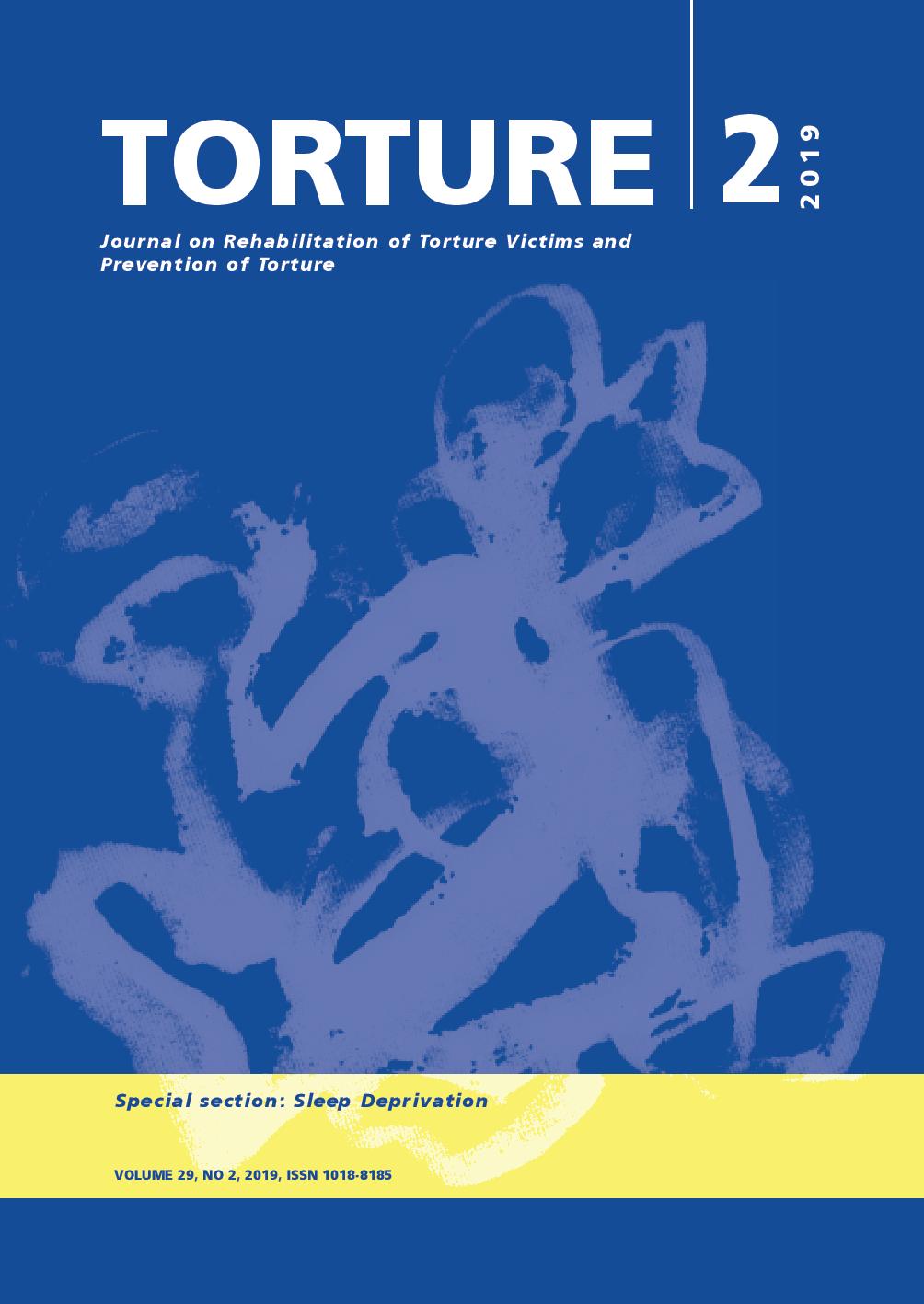Befogging reason, undermining will: Understanding the prohibition of sleep deprivation as torture and ill-treatment in international law
DOI:
https://doi.org/10.7146/torture.v29i2.109620Keywords:
Sleep deprivation, sleep adjustment, sleep regulation, interrogational torture, psychological tortureAbstract
Background: Sleep deprivation is a prevalent method of psychological torture. However, difficulties in documentation have meant that it is not adequately appreciated by courts and other quasijudicial institutions such as UN treaty bodies. Method: This paper aims to review the legal literature on deprivation of sleep, the definition, and prohibition of torture and ill-treatment, and its health impacts. A number of texts were identified and analyzed based on contextual relevance: criminal justice processes as well as medical literature on health impacts. The texts were identified via a search of key legal and health databases using the search terms “sleep deprivation,” “sleep adjustment,” and “sleep regulation.” These texts were limited to English-language journal articles, NGO reports, court-cases and UN documents since 1950. They were then analyzed for their approaches to conceptualizing sleep deprivation from the perspective of assessing “severe pain and suffering” and the “diminishment of mental capacity”. Results/Discussion: Sleep deprivation is an ill-defined and, in turn, poorly documented method of torture, particularly when prolonged or inflicted in combination with other
methods (e.g., threats) and conditions (e.g., disruptive environment or time of day). More nuanced legal principles, informed by medical evidence, are lacking. Applying these principles would sharpen its conceptualization.
References
B’Tselem & HaMoked. (2017). Unprotected; Detention of Palestinian Teenagers in East Jerusalem.
Başoğlu, M. (ed). (2017). Torture and Its Definition in International Law: An Interdisciplinary Approach. New York: Oxford University Press. doi.org/10.1093/med/9780199374625.001.0001
Beattie, L., S. D. Kyle, C. A. Espie, & S. M. Biello. (2015). Social interactions, emotion and sleep: A systematic review and research agenda. Sleep Medicine Reviews, 24, 83–100. doi: 10.1016/j.smrv.2014.12.005
Burgers, J.H, & Danelius, H. (1988). The United Nations Convention against Torture: A Handbook on the Convention Against Torture and Other Cruel, Inhuman or Degrading Treatment or Punishment. Dordrecht-Boston-London: Martinus Nijhoff.
Cakal, E. (2018). Debility, dependency and dread: On the conceptual and evidentiary dimensions of psychological torture. Torture Journal, 28(2), 15-37. doi.org/10.7146/torture.v28i2.106908
CPT. (2011). Turkey: Visit 2009, CPT/Inf (2011) 13.
CPT. (2015). Living space per prisoner in prison establishments: CPT standards, Strasbourg, 15 December 2015, CPT/Inf (2015) 44.
CPT. (2014). Ukraine: Visit 2013, CPT/Inf (2014).
Davis, D., & Leo, R. (2012). Acute suggestibility in police interrogation: self-regulation failure as a primary mechanism of vulnerability. In A. M. Ridley, F. Gabert, and D. La Rooy (Eds), Suggestibility in legal contexts,171–95. John Wiley and Sons. doi/abs/10.1002/9781118432907
Ginbar, Y. (2009) “Celebrating” a Decade of Legalised Torture in Israel.
Griffith, C. D., and S. Mahadevan. (2015). ‘Human reliability under sleep deprivation: Derivation of performance shaping factor multipliers from empirical data’, Reliability Engineering and System Safety, 144, no. Supplement C, 23–34. doi.org/10.1016/j.ress.2015.05.004
Kassin, S. M., Gudjonsson, G. H., & Kingdom, U. (2004). The psychology of confessions: a review of the literature and issues. Psychological Science in the Public Interest, 5(2), 33–67. doi: 10.1111/j.1529-1006.2004.00016.x
Leach, J. (2016). Psychological factors in exceptional, extreme and torturous environments. Extreme Physiology & Medicine 5:7. doi:doi.org/10.1186/s13728-016-0048-y
Lowe, C.J., Safati, A., & Hall, P. A.. (2017). The neurocognitive consequences of sleep restriction: A meta-analytic review. Neuroscience & Biobehavioral Reviews, 80, 586–604. doi: 10.1016/j.neubiorev.2017.07.010
Mendez, J., & Nicolescu, A., (2017). Evolving Standards for Torture in International Law. In Basoglu, M. Torture and Its Definition in International Law: An Interdisciplinary Approach (pp. 215-245). New York: Oxford University Press. dx.doi.org/doi:10.1093/med/9780199374625.001.0001
O’Mara, S. (2015). Why Torture Doesn’t Work: The Neuroscience of Interrogation. Cambridge, MA: Harvard University Press. doi: 10.13140/RG.2.1.2038.2246
Pérez-Sales, P. (2017). Psychological Torture: Definition, Evaluation and Measurement. London: Routledge. doi.org/doi:10.4324/9781315616940
Physicians for Human Rights and& Human Rights First. (2007). Leave No Marks: “Enhanced” interrogation techniques and the risk of criminality.
Pilcher, J.J., & Huffcutt, A. I.. (1996). Effects of sleep deprivation on performance: a meta-analysis. Sleep, 19 (4), 318–326.
Pires, G. N., A. G. Bezerra, S. Tufik, and M. L. Andersen. (2016). Effects of acute sleep deprivation on state anxiety levels: a systematic review and meta-analysis. Sleep Medicine, 24, 109–118. doi: 10.1016/j.sleep.2016.07.019
Rejali, D. (2007). Torture and Democracy. Princeton, NJ: Princeton University Press.
UN Body of Principles for the Protection of All Persons under Any Form of Detention or Imprisonment, GA Res 43/173 of 9 December 1988.
United Kingdom Home Office (2018). Police and Criminal Evidence Act 1984, CODE C: Revised Code of Practice for the detention, treatment and questioning of persons by Police Officers.
United States Army. (2006). Appendix M of the Army Field Manual Human Intelligence Collector Operations, FM 2-22.3 of September 2006.
Wickens, C. D., S. D. Hutchins, L. Laux, and A. Sebok. (2015). The Impact of Sleep Disruption on Complex Cognitive Tasks: A Meta-Analysis. Human Factors, 57(6), 930–946. doi: 10.1177/0018720815571935
Downloads
Published
How to Cite
Issue
Section
License
We accept that some authors (e.g. government employees in some countries) are unable to transfer copyright. The Creative Commons Licence Attribution-NonCommercial-NoDerivatives 4.0 International (CC BY-NC-ND 4.0) covers both the Torture Journal and the IRCT web site. The publisher will not put any limitation on the personal freedom of the author to use material contained in the paper in other works which may be published, provided that acknowledgement is made to the original place of publication.


